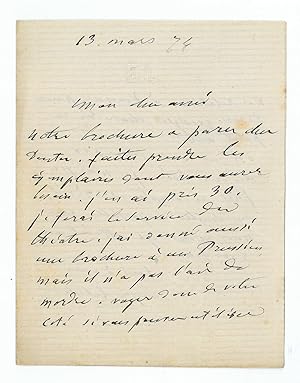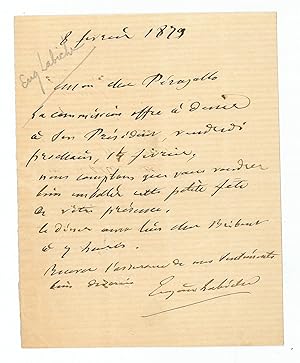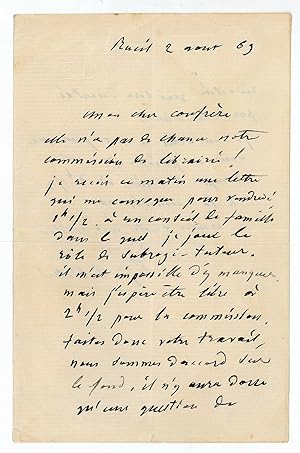labiche eugène french playwright (4 Ergebnisse)
Suchfilter
Produktart
- Alle Product Types
- Bücher (1)
- Magazine & Zeitschriften (Keine weiteren Ergebnisse entsprechen dieser Verfeinerung)
- Comics (Keine weiteren Ergebnisse entsprechen dieser Verfeinerung)
- Noten (Keine weiteren Ergebnisse entsprechen dieser Verfeinerung)
- Kunst, Grafik & Poster (Keine weiteren Ergebnisse entsprechen dieser Verfeinerung)
- Fotografien (Keine weiteren Ergebnisse entsprechen dieser Verfeinerung)
- Karten (Keine weiteren Ergebnisse entsprechen dieser Verfeinerung)
- Manuskripte & Papierantiquitäten (3)
Zustand Mehr dazu
- Neu (Keine weiteren Ergebnisse entsprechen dieser Verfeinerung)
- Wie Neu, Sehr Gut oder Gut Bis Sehr Gut (Keine weiteren Ergebnisse entsprechen dieser Verfeinerung)
- Gut oder Befriedigend (Keine weiteren Ergebnisse entsprechen dieser Verfeinerung)
- Ausreichend oder Schlecht (Keine weiteren Ergebnisse entsprechen dieser Verfeinerung)
- Wie beschrieben (4)
Einband
- alle Einbände
- Hardcover (Keine weiteren Ergebnisse entsprechen dieser Verfeinerung)
- Softcover (1)
Weitere Eigenschaften
- Erstausgabe (Keine weiteren Ergebnisse entsprechen dieser Verfeinerung)
- Signiert (Keine weiteren Ergebnisse entsprechen dieser Verfeinerung)
- Schutzumschlag (Keine weiteren Ergebnisse entsprechen dieser Verfeinerung)
- Angebotsfoto (4)
- Keine Print-on-Demand Angebote (4)
Sprache (1)
Preis
- Beliebiger Preis
- Weniger als EUR 20 (Keine weiteren Ergebnisse entsprechen dieser Verfeinerung)
- EUR 20 bis EUR 45 (Keine weiteren Ergebnisse entsprechen dieser Verfeinerung)
- Mehr als EUR 45
Gratisversand
- Kostenloser Versand nach USA (Keine weiteren Ergebnisse entsprechen dieser Verfeinerung)
Land des Verkäufers
Verkäuferbewertung
-
Autograph letter signed.
Verlag: [Paris, postmark], 13. III. 1874., 1874
Anbieter: Antiquariat INLIBRIS Gilhofer Nfg. GmbH, Vienna, A, Österreich
Manuskript / Papierantiquität
EUR 250,00
Währung umrechnenEUR 30,00 für den Versand von Österreich nach USAAnzahl: 1 verfügbar
In den Warenkorb12mo. 2 pp. on bifolium. With autograph envelope. To the playwright and librettist Philippe Gille, concerning the publication of a play that Labiche and Galle had co-authored. Labiche informs Gille that he has taken 30 copies for himself and gave one to "a Prussian", although he did not "seem to take the bait". Gille, on his part, should try to profit from his "connections to Vienna" in order "to make something of this little act". In closing, Labiche estimates their not yet satisfactory revenues. The letter in full: "Notre brochure a paru chez Dentu. Faites prendre les exemplaires dont vous aurez besoin. J'en ai pris 30. Je ferai le service du théâtre. J'ai donné aussi une brochure à un Prussien mais il n'a pas l'air de mordre. Voyez donc de votre côté si vous pouvez utiliser vos relations à Vienne pour tirer quelque chose de ce petit acte. - On ne nous joue pas aujourd'hui, je n'ai pas fait le compte, mais il me semble impossible que nous ayons déjà atteint un 5000 francs". - The play in question can be identified as the comedy "Garanti dix ans" (Paris, Dentu, 1874). Philippe Gille (1831-1901) is best known today for his co-authoring the librettos for Léo Delibes' opera "Lakmé" with Edmond Gondinet and Jules Massenet's "Manon" with Henri Meilhac. - On stationery with embossed monogram "EL". Minimally stained.
-
Autograph letter signed.
Verlag: N. p., 8. II. 1879., 1879
Anbieter: Antiquariat INLIBRIS Gilhofer Nfg. GmbH, Vienna, A, Österreich
Manuskript / Papierantiquität
EUR 120,00
Währung umrechnenEUR 30,00 für den Versand von Österreich nach USAAnzahl: 1 verfügbar
In den Warenkorb12mo. 1 p. Inviting the general agent of the Société des auteurs et compositeurs dramatiques Léonce Péragallo (1821-82) to the farewell party of the president of an unspecified commission: "La commission offre adieux à son Président, vendredi prochain, 14 février, nous comptons que vous voudrez bien embellir cette petite fête de votre présence [.]". - Well preserved.
-
Autograph letter signed.
Verlag: Rueil, 2. VIII. 1869., 1869
Anbieter: Antiquariat INLIBRIS Gilhofer Nfg. GmbH, Vienna, A, Österreich
Manuskript / Papierantiquität
EUR 220,00
Währung umrechnenEUR 30,00 für den Versand von Österreich nach USAAnzahl: 1 verfügbar
In den Warenkorb8vo. 2 pp. on bifolium. In French. To a colleague about a family council he is required to attend on Friday as acting guardian, hoping to be able to join the booksellers' commission afterwards, encouraging him to continue his work, and mentioning editorial work as the sole issue to be discussed by the commission: "Mon cher confrère elle n'a pas de chance notre commission de librairie! je reçois ce matin une lettre qui me convoque pour vendredi, 1h ½, à un conseil de famille dans le quel je jeux le rôle de subrogé-tuteur. il m'est impossible d'y manquer, mais j'espère être libre à 2h ½ pour la commission. faites donc votre travail, nous sommes d'accord sur le fond, il n'y aura donc qu'une question de rédaction qui sera discutée par la commission [.]". - On stationery with blindstamped initials. Small marginal tears to centrefold and upper edge; slightly creased.
-
Autograph letter signed.
Verlag: [Paris, 1868]., 1868
Anbieter: Antiquariat INLIBRIS Gilhofer Nfg. GmbH, Vienna, A, Österreich
EUR 450,00
Währung umrechnenEUR 30,00 für den Versand von Österreich nach USAAnzahl: 1 verfügbar
In den Warenkorb8vo. 6 pp. Probably to the journalist, playwright and poet Edmond Cottinet (1824-95) following a first reading of their collaborative comedy in four acts, "Le Roi d'Amatibou", at the théâtre du Palais-Royal . Apart from the 3rd Act that still had "some lengths", the reading was a success, even though the male lead Jules Brasseur did not participate (having leave of absence). The central part of the letter concerns two pieces of theatre music that still needed to be composed for the play. Apparently, Cottinet had opted for the young Camille Saint-Saëns, a choice that was met with great skepticism. Labiche informs him that the theatre managers Léon Dormeuil and Francis de Plunkett and the actors were much more inclined to commission Hervé (1825-92), paraphrasing their reasoning: "Hervé c'est le connu, Saint-Saëns c'est l'inconnu. Il a un très grand talent, mais saura-t-il s'assouplir à un genre qui est si loin du sien. Si le morceau du concert n'est pas follement réussi, la pièce est perdue, ce doit être le bouquet du feu d'artifice. Maintenant si Saint-Saëns ne le réussit pas, comme notre position devient délicat et difficile vis-à-vis d'un de ce talent qui nous aura offert si obligeamment sa musique". Ultimately, Labiche also opted for Hervé, even though he does not hide his low opinion of the composer, who would nevertheless attract Parisian audiences: "Dernière considération : je ne crois pas que vous ayez la dose d'extravagance et de bêtise suffisante pour réussir cette insanité. Hervé nous fera au besoin les paroles et la musique. Cela sera révoltant et gâteux, mais cela fera courir tout Paris []". Hervé did indeed compose the music for "Le Roi d'Amatibou", and the play premiered at the théâtre du Palais-Royal on 27 November 1868.





